The summer would be here in no time. Are you planning on a beach vacation or off to a cycling ride or a hiking adventure? Any summer vacations outdoor plans should involve buying some sunscreens to protect your skin. We review some of the best sunscreens that you can buy online.
Skin Exposure
Exposure of the skin to ultraviolet ray has many direct consequences which cannot be overemphasized. Some of these consequences are sunburn, skin cancer, skin irritation, rapid skin aging, etc. When the skin is subjected to ultraviolet radiation, the chances of being infected with malignant melanoma; a cancer of melanocytes, drastically increases.
Melanin is a natural skin pigment that absorbs ultraviolet radiation; this pigment has the ability to dissolve over 9.99% of absorbed radiation, and it is mostly present in dark skins.
The damage caused to the skin due to its exposure to ultraviolet rays makes it essential for your skin to be well protected even in cloudy weather. Formulation of sunscreen or sun block provides the best solution to this exposure.
The truth is there are numerous sunscreen products in the markets that may also cause damage to the skin because of their chemical composition. Hence, we have made a list of eight best sunscreens that are suitable for you; placing into consideration their mineral compositions.
Caution
Sunscreen, just like every other chemical product has a period of expiration, and should therefore never be used past its expiration date. At their expiration, sunscreens produce a watery consistency. They also become less effectual; thereby leading to a significant increase in the potential to cause sunburns, sun damage, brown spots, and the risk for skin cancer development.
Chemical sunscreens which contain elements such as oxybenzone, avobenzone, and homosalate can corrode and as a result become ineffective. Mineral sunscreens — those with zinc oxide or titanium dioxide on the label — don’t oxidize; nevertheless they degrade.
[wpsm_titlebox title=”Best Sunscreens For Women ” style=”4″][wpsm_toplist][/wpsm_titlebox]
La Roche-Posay Anthelios Ultra-Light Mineral Sunscreen
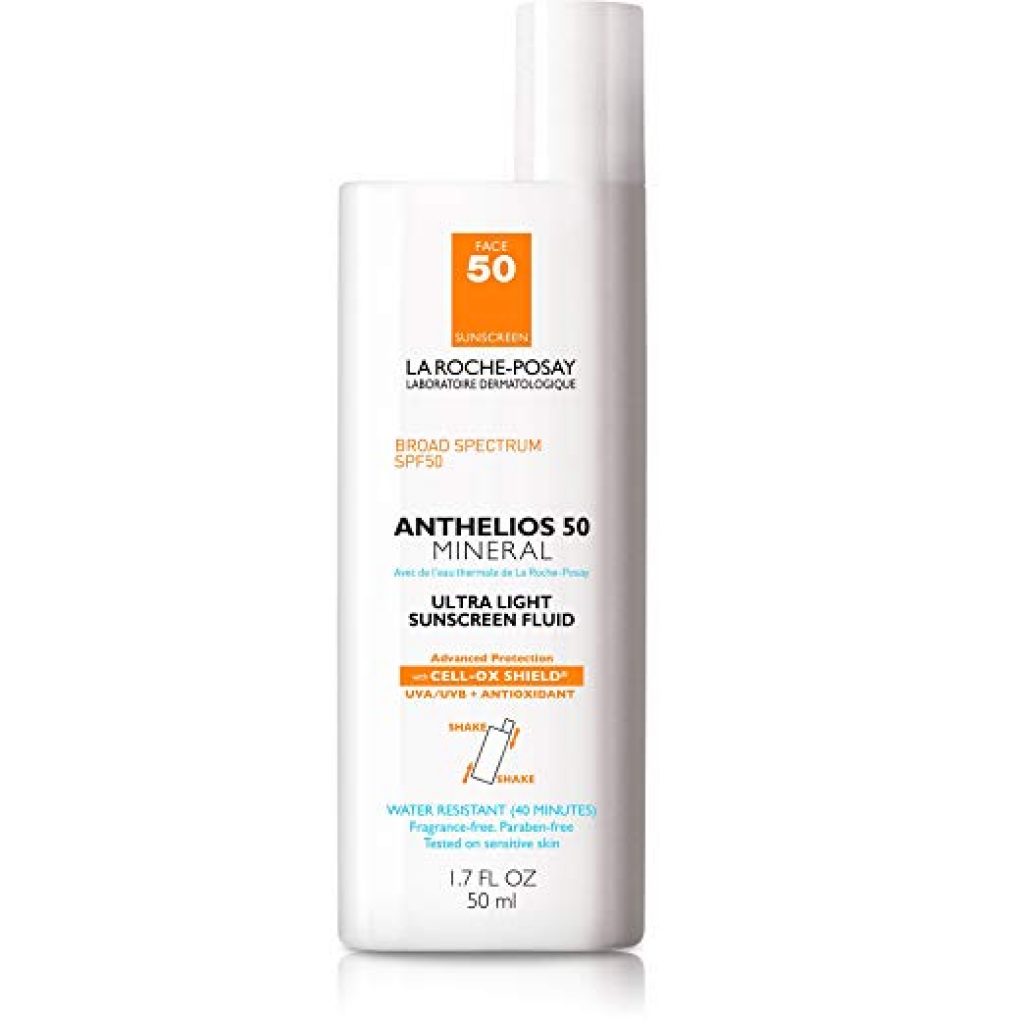
La Roche-Posay is a cult-favorite French mineral sunscreen is expensive; it is however worth the splurge. This unique sunscreen possesses a feather-light finish. One of its uniqueness is the fact that it was made with consideration of sensitive and intolerant skin types, but the real draw is that the moisturizing lotion dries down to an almost-matte finish, so you will never look shiny.
Revision Skincare Intellishade Truphysical Moisturizer
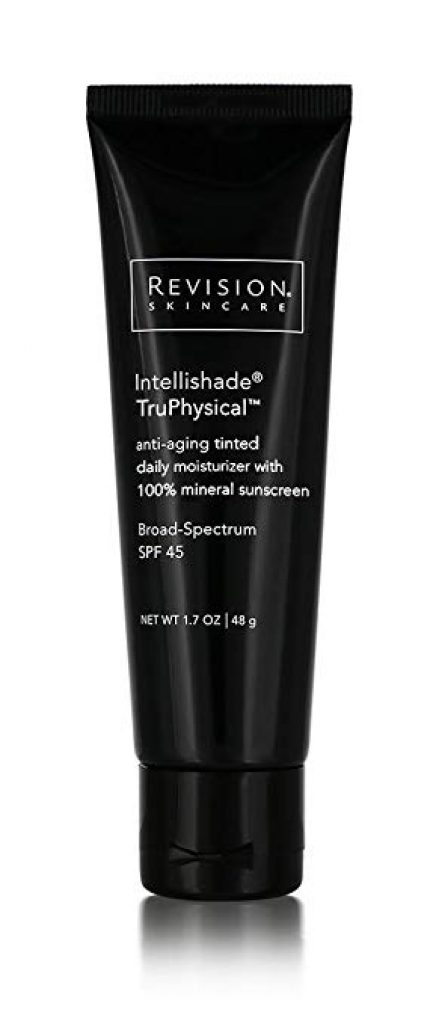
Revision Skincare Intellishade is the best sunscreen for your face, as recommended by dermatologists. This product is the first of its kind to be invented; with all mineral sunscreen constituents. It provides anti-aging and hydration benefits to the skin. This mineral sunscreen contains zinc oxide and titanium dioxide.
Neutrogena Ultrasheer Dry-touch Sunblock
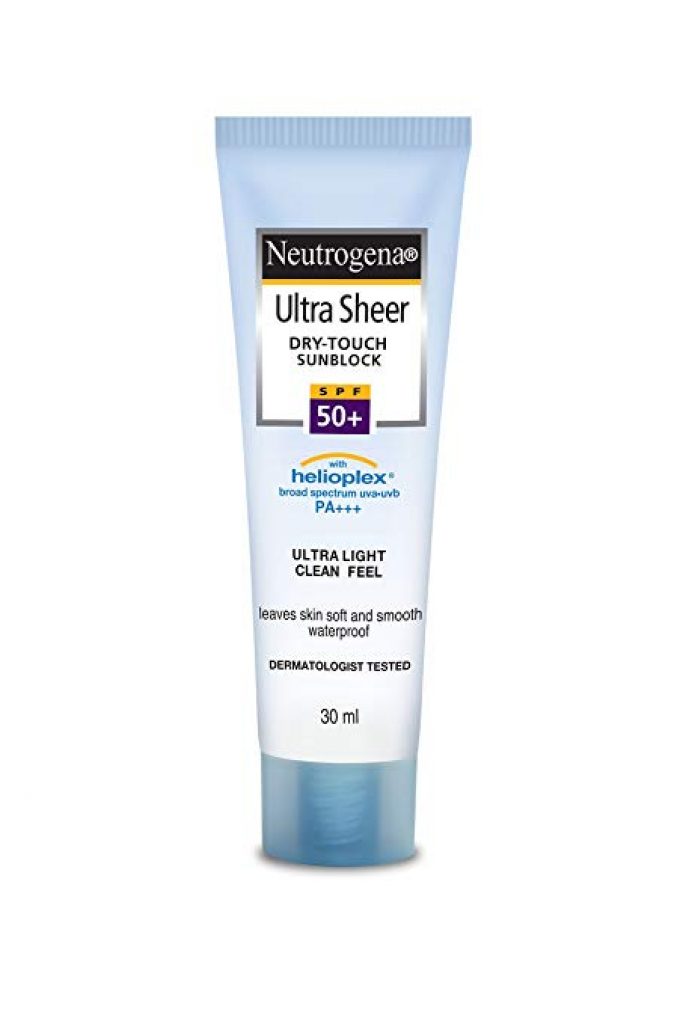
Top dermatologists recommend the use of Neutrogena sunblock lotion. This is as a result of the fact that it is oil-free, suits sensitive skin types and contains the patented Helioplex compound for added protection from UVA/UVB rays. You are definitely going to love the clean and ultralight feel it gives.
EltaMD UV Physical Tinted Facial Sunscreen

Various research carried out on this subject has shown that it is greatly endorsed by several dermatologists. It is a non-comedogenic, fragrance free and paraben-free sunscreen for anyone with blemish-prone skin.
Blue Lizard Australian Sunscreen
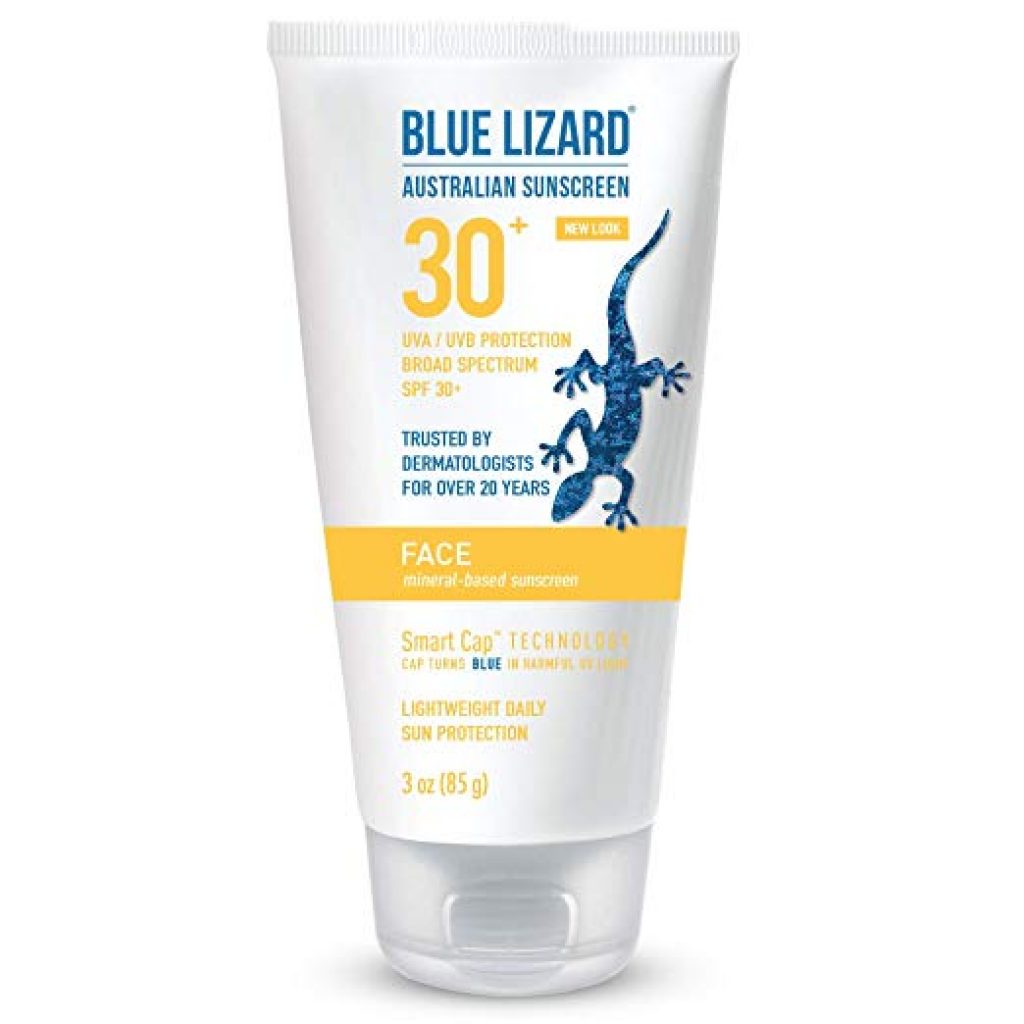
The Australian brand, Blue Lizard, formulated this mineral-based sunscreen together with dermatologists; who made sure it would be safe for even the most sensitive skin types. This brand offers sunscreens for babies, kids, and adults.
Every sunscreen lotion, of this brand, is highly recommended because it is made without parabens, fragrances, or any known irritants that are likely to cause havoc on sensitive skin types. Oh yeah, it is water-resistant so you don’t have to worry about sweating either.
Naturopathica Daily UV Defense Cream SPF 50
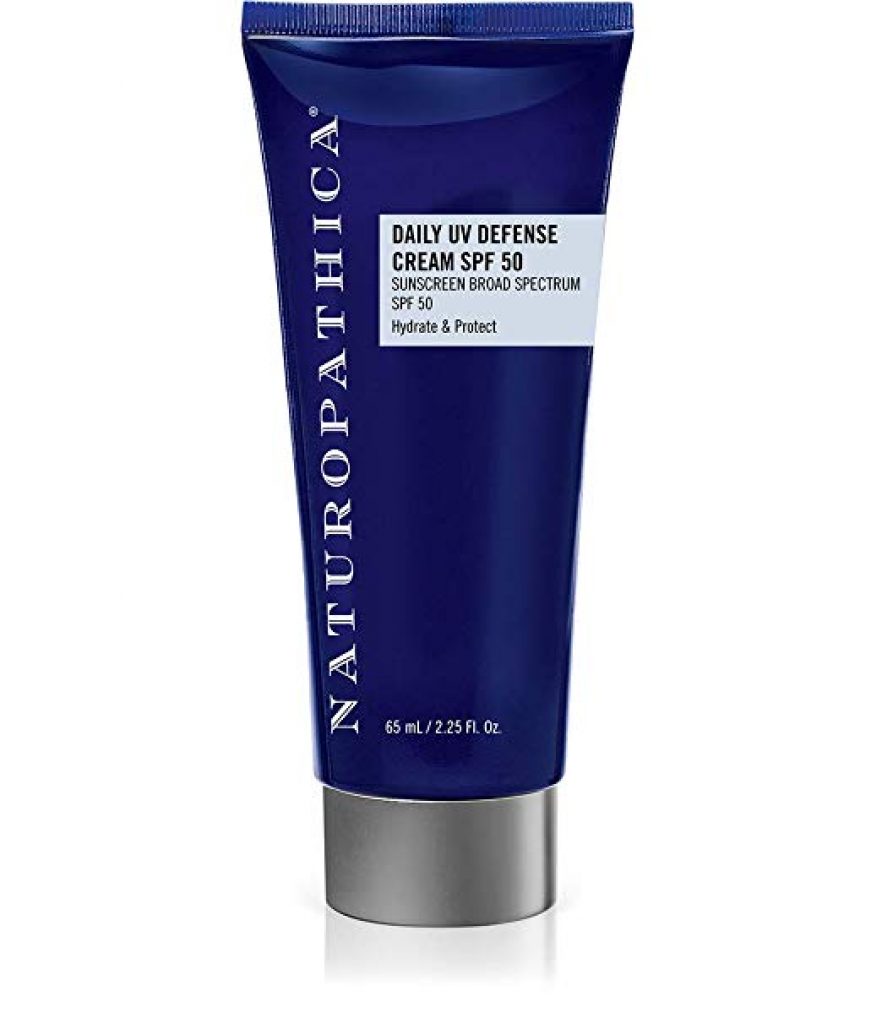
Naturopathica is an organic category of sunscreen which contains micronized zinc oxide. In addition, moisturizing agents like green tea extract, acai fruit oil, shea butter are included in this product. These contents ensure that your skin complexion stays relaxed and calm all day long.
When you have sensitive skin that easily gets inflamed under the sun rays, it is plausible to be cautious about what products you apply on your face — sunscreen included. According to Shari Marchbein, a New York City-based dermatologist: “People with sensitive skin usually have a difficult time finding sunscreens that are suitable for them; this is owing to the fact that most sunscreens are manufactured with chemical UV blockers that tend to trigger stinging, burning, irritations and redness”. Marchbein stated that “As a substitute, you ought to look for physical blockers like zinc oxide and titanium dioxide, which can be found in baby sunscreens and most that are labeled for sensitive skin.”
Furthermore, Marchbein warns that some sunscreens are hybrids, they contain both physical and chemical UV filters; therefore, attention should be paid to the ingredient list. However, the ever-growing skin-care market is catering more to those with reactive skin, so it’s no longer tough to find a formula that will suit your skin.
Kiss My Face Kids Mineral SPF 30
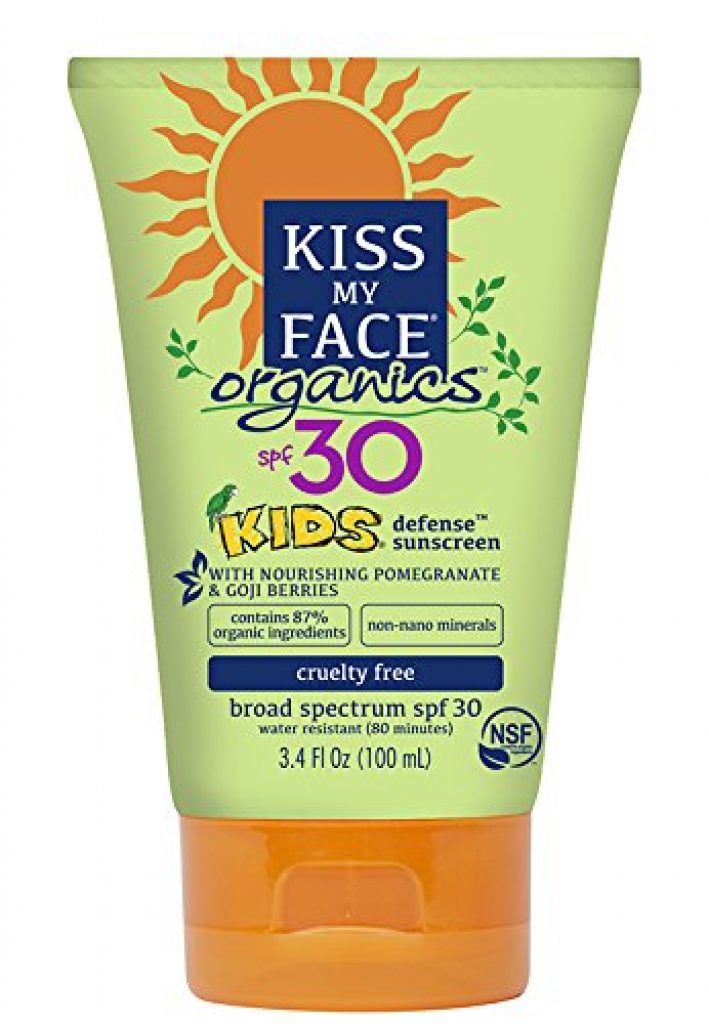
This is by far one of the best natural sunscreens for kids, and is made from rich mineral ingredients. It is a kid-friendly sunblock, but also great for sporty types. With SPF 30 and water resistant for up to 80 minutes, this natural sunscreen permits abundant play under the sunshine. This sunscreen has been formulated with both titanium dioxide and zinc oxide.
The other ingredients contained in this sunscreen are natural and organic: they include beeswax, sesame oil, and sunflower oil. This product is also stimulated with antioxidants; goji berry and pomegranate extracts which allow for an additional layer of resistance against the aging effects of the sun.
Tarteguard 30 mineral powder sunscreen
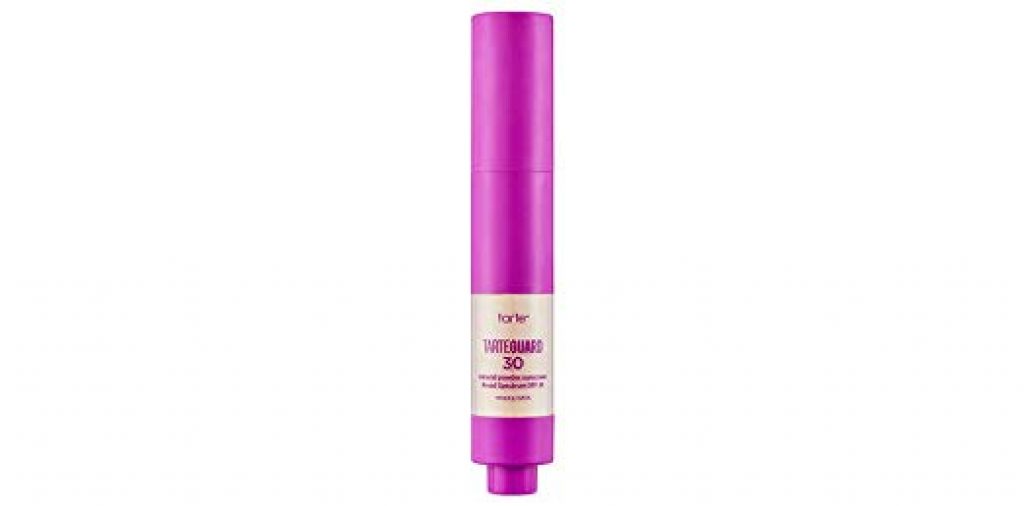
The SPF number on the bottle is only as useful as how often you reapply your sunscreen. This mineral powder sunscreen is a convenient brush-on formula which makes revitalizing your complexion and protecting your skin a no-brainer.
How Sunscreens Work
Some inorganic chemicals, which include minerals such as zinc oxide or titanium dioxide; function as a physical sunblock. They reflect ultraviolet rays, comparable to how white paint reflects light. The white-colored nudges on beach-goers in the 1980s and 1990s were due to these compounds; however presently, the visible white is almost invisible because present day manufacturers make the inorganic particles much smaller.
In addition to inorganic chemicals, sunscreens often contain organic chemicals such as avobenzone or oxybenzone. Rather than physically repelling ultraviolet light; these molecules absorb ultraviolet radiation through their chemical bonds. As the bonds attract the UV radiation, the constituents of the sunscreen slowly break down and discharge.
How to Use Sunscrens
1. You can never apply enough sunscreen! Marchbein attested that “One ounce, which is approximately a shot glass-size; is needed for the face and body”. She advises that if you’re covered below the neck during your beach holiday and only need to apply SPF to your face; use a teaspoon. Marchbein furthermore states that “Majority of cream sunscreens are three ounces, whereas sprays are often four ounces; therefore, one third – one quarter of the bottle should be applied at an interval of two hours.”
2. Reapply sunscreen religiously for best effects. Erin Gilbert, a board-certified dermatologist in New York City, stressed that sunscreen should be reapplied every two hours. “If you’re wearing makeup, a powdered sunscreen can make reapplication a less-daunting task.”
3. Supplementing your skin-care routine with antioxidants helps to shield your skin from sun damage, says Gilbert. “Vitamin C is a potent antioxidant that not only fortifies your skin but also repeals some of the pigmentation caused by UV exposure.”
4. In addition to sunscreen, carry along a hat or umbrella for added protection from the sunrays. “… sunscreen alone may not be enough to fully protect you from the sun,” Gilbert discloses. “There are tons of cute hats out there, as well as SPF workout gear; so no excuses, people!”
Sunscreen is expected to afford skin protection for up to two hours if applied as instructed. In order for a more lasting protection beyond two hours; sunscreen must be reapplied substantially to all exposed areas of the skin. If you are sweating or spending time in the water, sunscreen needs to be reapplied approximately once in every 80 minutes; although, it may depend on the type of sunscreen you use. This is why it is necessary to always check your sunscreen product for directions. Lastly, sunscreen should be immediately reapplied after towel drying your body.
Ingredients to Avoid In Sunscreens
In a recent Environmental Working Group report, 75% of the sunscreen products that were examined delivered unsatisfactory protection from the sun. Most sunscreens obtainable today usually offer protection in the form of either a mineral sunscreen or a chemical sunscreen.
Mineral sunscreens are formulated with zinc oxide and titanium dioxide. These minerals rest on the surface of your skin and physically redirect sunlight away from the skin. Chemical sunscreens on the other hand, work a bit differently and have raised concern amongst dermatologists and researchers. Instead of physically deflecting UV light away from the skin, chemical sunscreens absorb the UV radiation into the skin and disperse the energy via a chemical reaction under the skin.
Additionally, there is worry that chemical sunscreen ingredients have the capability of permeating the skin and causing hormone disruption and allergic reactions. Hence, the EWG and most dermatologists highly recommend the use of mineral sunscreens instead of chemical sunscreens. Common chemical sunscreen ingredients that should be avoided include oxybenzone (one of the worst offenders), avobenzone, octisalate, octocrylene, homosalate, and ctinoxate. To learn more about sunscreens and how they work, especially chemical sunscreens, there is need to ask various questions, such as:
- Will this get absorbed by the skin and into other tissues in the body?
- Does this chemical have the potential to upset hormones; especially in children?
- Are there any long-term implications or allergy reactions involved when these chemicals are used?

Comments are closed